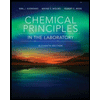TRUE OR FALSE 1. Increasing the temperature will increase the kinetic energy of particles, therefore increasing the collisions between particles. 2. Usually lowering the temperature will slow down a reaction. 3. Increasing the concentration of the reactants will slow down the reaction. 4. A catalyst increases the efficiency of collisions between reactants 5. You observe bubbles after adding metal to a solution. Do you assume a chemical reaction took place? YES OR NO?
TRUE OR FALSE 1. Increasing the temperature will increase the kinetic energy of particles, therefore increasing the collisions between particles. 2. Usually lowering the temperature will slow down a reaction. 3. Increasing the concentration of the reactants will slow down the reaction. 4. A catalyst increases the efficiency of collisions between reactants 5. You observe bubbles after adding metal to a solution. Do you assume a chemical reaction took place? YES OR NO?
Introductory Chemistry: A Foundation
9th Edition
ISBN:9781337399425
Author:Steven S. Zumdahl, Donald J. DeCoste
Publisher:Steven S. Zumdahl, Donald J. DeCoste
Chapter17: Equilibrium
Section: Chapter Questions
Problem 10CR: . Explain what it means that a reaction has reached a state of chemical equilibrium. Explain why...
Related questions
Question

Transcribed Image Text:TRUE OR FALSE
1. Increasing the temperature will increase the kinetic energy of particles,
therefore increasing the collisions between particles.
2. Usually lowering the temperature will slow down a reaction.
3. Increasing the concentration of the reactants will slow down the reaction.
4. A catalyst increases the efficiency of collisions between reactants
5. You observe bubbles after adding metal to a solution. Do you assume a
chemical reaction took place? YES OR NO?
Expert Solution
This question has been solved!
Explore an expertly crafted, step-by-step solution for a thorough understanding of key concepts.
Step by step
Solved in 6 steps

Knowledge Booster
Learn more about
Need a deep-dive on the concept behind this application? Look no further. Learn more about this topic, chemistry and related others by exploring similar questions and additional content below.Recommended textbooks for you

Introductory Chemistry: A Foundation
Chemistry
ISBN:
9781337399425
Author:
Steven S. Zumdahl, Donald J. DeCoste
Publisher:
Cengage Learning

General, Organic, and Biological Chemistry
Chemistry
ISBN:
9781285853918
Author:
H. Stephen Stoker
Publisher:
Cengage Learning

Chemistry: Matter and Change
Chemistry
ISBN:
9780078746376
Author:
Dinah Zike, Laurel Dingrando, Nicholas Hainen, Cheryl Wistrom
Publisher:
Glencoe/McGraw-Hill School Pub Co

Introductory Chemistry: A Foundation
Chemistry
ISBN:
9781337399425
Author:
Steven S. Zumdahl, Donald J. DeCoste
Publisher:
Cengage Learning

General, Organic, and Biological Chemistry
Chemistry
ISBN:
9781285853918
Author:
H. Stephen Stoker
Publisher:
Cengage Learning

Chemistry: Matter and Change
Chemistry
ISBN:
9780078746376
Author:
Dinah Zike, Laurel Dingrando, Nicholas Hainen, Cheryl Wistrom
Publisher:
Glencoe/McGraw-Hill School Pub Co

Chemical Principles in the Laboratory
Chemistry
ISBN:
9781305264434
Author:
Emil Slowinski, Wayne C. Wolsey, Robert Rossi
Publisher:
Brooks Cole

Introductory Chemistry: An Active Learning Approa…
Chemistry
ISBN:
9781305079250
Author:
Mark S. Cracolice, Ed Peters
Publisher:
Cengage Learning

Chemistry by OpenStax (2015-05-04)
Chemistry
ISBN:
9781938168390
Author:
Klaus Theopold, Richard H Langley, Paul Flowers, William R. Robinson, Mark Blaser
Publisher:
OpenStax